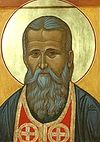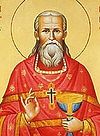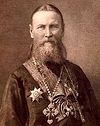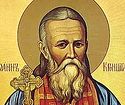

| Previous day | Next day |
| Old Style
December 20
|
Monday |
New Style
January 2
|
|
30th Week after Pentecost.
Tone 4.
Nativity Fast. |
Monastic rule: xerophagy (bread, uncooked fruits and vegetables).
|
![]() Forefeast of the Nativity of Christ.
Forefeast of the Nativity of Christ. ![]() Hieromartyr Ignatius the Godbearer, bishop of Antioch (107).
Hieromartyr Ignatius the Godbearer, bishop of Antioch (107). ![]() Repose of Righteous John of Kronstadt (1908). St. Anthony (Smirnitsky), archbishop of Voronezh (1846).
Repose of Righteous John of Kronstadt (1908). St. Anthony (Smirnitsky), archbishop of Voronezh (1846).
St. Philogonius, bishop of Antioch (323). St. Daniel II, archbishop of Serbia (1338). St. Ignatius, archimandrite, of the Kiev Caves (1435).
New Hieromartyr Nicholas Chernishev, archpriest, and his daughter, Martyr Barbara (1919).
New Martyr John of the island of Thasos, at Constantinople (1652).
Thoughts for Each Day of the Year
According to the Daily Church Readings from the Word of God
By St. Theophan the Recluse

Monday. [Heb. 11:17-23, 27-31; Mark 9:42-10:1]
Every one shall be salted with fire, and every sacrifice shall be salted with salt. Before this the Lord said that one must be prepared for all sorts of sacrifice and all deeds of self-denial, only to stand on the good path. Though these sacrifices are dear to us, like our own eye, or indispensable like our right hand, we must offer them without a moment’s hesitation; for if you grudge offering such a sacrifice, and are lead away because of this from the right path to the wrong, you will be forced to suffer eternally in the future life. So, offer painful and sorrowful sacrifice here to avoid torments there. Without purification by fire here one cannot be saved from the eternal fire. Everyone desiring to be saved must be salted with fire, and pass through purification by fire. All of us, by the law of our creation, must offer ourselves in sacrifice to God; but every one of us is impure. That means we must purify ourselves, so that from us will be made a sacrifice pleasing to God. But if you start to purify yourself, unearth passions from your soul, it will be painful, like being burned with fire. This operation of inner self-purification is like the operation of fire purifying metal. Metal is without feeling. If you were to give it feeling, it would feel the purifying and the burning simultaneously. The same thing occurs in a person who purifies himself. Undergoing this operation he is as if burned through by fire. The purifying fire passes through all of the parts of his body like salt penetrates a body which is being salt-preserved. And only he who subjects himself to this operation is a truly God-pleasing sacrifice; that is why it is necessary for everyone to be salted with fire, as in the Old Testament, where every sacrifice was salted before offering it as a whole burnt offering.
Articles
 St. Daniel II the Archbishop of SerbiaSaint Daniel of Serbia, the only son of rich and renowned parents, was a close associate of the Serbian king Stephan Urosh Milutin. |












